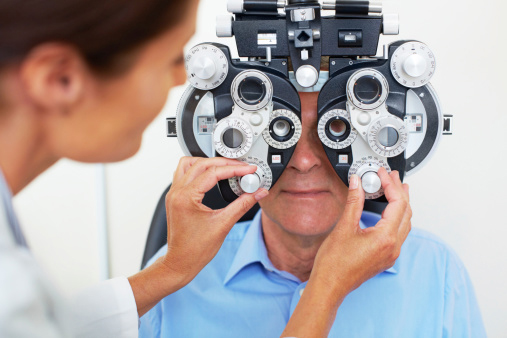 |
|
Although impaired visual acuity may lead to hallucinations directly due to functional deafferentation, depression or agitation and their associations with self-reported visual impairment may be mediated by daily activities, social engagement and other psychosocial factors not as closely linked with visual acuity. Photo: Getty Images. Click image to enlarge. |
Researchers from the University of Pennsylvania recently examined data from a large study of dementia patients called the Aging, Demographics and Memory Study (ADAMS) to analyze any associations between vision and this subset of neurodegenerative disorders. Visual impairment has already been identified as a risk factor for cognitive impairment and hallucinations in older individuals, but other neuropsychiatric symptoms have not yet been examined on this front.
The ADAMS is a nationally representative US population sample of those aged 70 or older, with vision being measured by self-report using a near vision card. Dementia was determined through cognitive testing with expert consensus and neuropsych symptoms were screened with the Neuropsychiatric Inventory Questionnaire, a screening tool commonly used in neurology.
Of the 624 patients with dementia included in the study, 53% self-reported visual impairment and 31% had 20/40 best-corrected visual acuity or worse. Unadjusted models displayed that self-reported visual impairment was associated with hallucinations, depression and agitation, while reduced acuity was associated with hallucinations, psychosis and mania. After adjusting for sociodemographic factors and comorbidities, however, these associations did not remain significant.
In their paper on the study for Journal of Neuro-ophthalmology, the authors relayed that the self-reported visual impairment and hallucinations link reflects findings of a previous study, subsequently supporting the hypothesis that older adults with dementia and visual impairment experience functional visual cortex deafferentation, which can lead to associative cortical areas’ disinhibition, releasing hallucinatory images.
Despite this connection, a causal relationship between the visual impairment and hallucinations with dementia is still unclear, at least with self-reported visual impairment. This is because a patient’s impairment or disability perception will also depend on premorbid functional level, symptom burden, daily activities, comorbidities and quality of life, on top of actual physical function. Self-reports also are limited in that symptoms like difficulty reading can be caused by underlying neurodegenerative disease instead of refractive error or ophthalmic disease.
Self-reported visual impairment was linked with depression, which also reflects prior investigations. However, not previously found was the novel association uncovered here that agitation was linked with visual impairment. Interestingly, depression and agitation were not associated with reduced near acuity, while hallucinations and psychosis were linked with both self-reported visual impairment and reduced near acuity. The authors speculate this difference could be because the relationship between vision and neuropsychiatric symptoms of dementia occur by different mechanisms.
The authors acknowledged that some of their data “may be explained by age, comorbidities and other risk factors, [but] the fact that self-reported visual impairment and reduced near acuity were both associated with hallucinations and psychosis supports future efforts to improve the clinical management of neuropsychiatric symptoms of dementia through strategies that address vision loss.”
In terms of ocular care, they believe that that, “given the increasing prevalence of sight-threatening eye disease such as cataract, diabetic retinopathy and macular degeneration among the elderly population worldwide, these findings highlight the importance of early and ongoing ophthalmologic care for older adults beyond correcting refractive error because effective treatments such as surgery, laser photocoagulation and intravitreal injection may halt or slow the progression of vision loss in these disease entities.”
Li M, Hamedani AG. Association of visual impairment with neuropsychiatric symptoms of dementia. J Neuroophthalmol. August 16, 2024. [Epub ahead of print]. |


